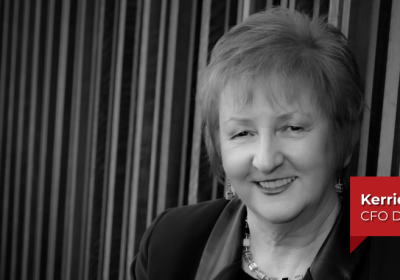
- Author: Nicole Madigan
- Posted: February 25, 2025
The Rise of the Fractional CFO > Sarah Petty
After more than 20 years in the corporate world, Sarah Petty made the leap from corporate finance to running her own fractional CFO business. Sarah shares her experiences and honest insights with CFO Magazine A/NZ’s Nicole Madigan, including the pros, cons and how to know if you’re ready to make the change.
Sarah Petty has more than 20 years’ experience in the finance industry. Starting her career as an analyst, Petty worked her way through to senior analyst, finance manager, senior finance manager roles, before moving into a CFO role.
“I’ve had a broad career across different finance functions—commercial finance, accounting, FP&A—kind of covered all bases to have a really generalist career,” says Petty.
Throughout most of her career, Petty worked for multinational and ASX-listed businesses, handling billion-dollar revenues with large finance teams. It was challenging and diverse work, but Petty had always wanted to lead a finance team.
Her career took a turn when she transitioned from large corporations to a mid-tier, privately owned business as its CFO.
“That was a bit of a change in itself, going from really large businesses to a smaller one as the CFO,” Sarah reflects.
She enjoyed the challenge of being the woman in charge, but the individualised nature of the role took some getting used to.
“It was kind of just me. I had a finance team, but when you work in corporates and get stuck with a tricky question, there’s always an expert around – another CFO of a business unit or someone you can lean on. But with this, the buck stopped with me.”
This shift forced Sarah to be more resourceful, leveraging her external network and working with advisors to fill skill gaps. She found herself drawn to the agility and problem-solving nature of the role.
“There were a lot of new opportunities where we hadn’t delivered to a particular market before or worked with that type of client. Rather than think about all the reasons why not, the business had an approach of, ‘Let’s say yes and then work out how to go about it.’”
She also found inspiration in the business owners she worked with.
“The founders were still heavily involved from a strategic and business development perspective. I liked working directly with them—they’ve got really entrepreneurial minds and are quite innovative and willing to take some risks. It made me realise that maybe entrepreneurship was something I could do.”
The Shift from Corporate to Entrepreneurship
Working for a smaller firm, and so closely with the owners, piqued Petty’s interest in entrepreneurship and creativity. She’d heard of virtual and fractional CFO careers but didn’t know anyone in her direct network who had made the leap.
“I reached out to some people via LinkedIn and contacts I had to ask a few questions about how they found it and what it actually involved. It seemed quite appealing —flexibility, working with business owners directly, and problem-solving,” she says.
As she explored the idea, putting some feelers out to gauge general interest, Petty found that many of the businesses she reached out to actually wanted to engage her services.
“It got to the point where people were passing me on to other business owners, and I realised I couldn’t manage it on top of a full-time CFO role. I had to make the leap or decide not to.”
The decision wasn’t easy, but Petty knew she didn’t want to look back with regrets. “It required a strong belief in myself to take that leap. But I always thought, if it fails, I can fall back on my corporate career.”
The Challenges of Running a Fractional CFO Business
While Petty received strong support from some peers, others were sceptical. “Some people have been fantastic — referring me to new clients, encouraging me, supporting my marketing,” she says.
“But others made comments like, ‘Good luck with that,’ or, ‘Most businesses fail in the first year.’
“It wasn’t necessarily meant to be negative, but when you’re making a big change, it can trigger other people’s fears.”
Once she’d made the switch, Petty quickly realised that becoming a fractional CFO involved more than simply taking on a bunch of new clients.
Essentially, Petty was now running her own business, which meant taking on roles beyond managing the finances.
“As a finance professional, you’re not usually the face of a company. But now, I had to build my own brand and put myself out there.”
Petty worked with a business coach to help her develop a personal brand and marketing strategy.
“My first networking event as a business owner was nerve-wracking. I felt like I wasn’t a real business owner and rambled on about what I did. But with practice and a strategy, I became more confident.”
Another challenge is sales – you can’t run a business without clients, and you can’t attract clients without putting some effort into prospecting.
“I had to become a salesperson. I didn’t realise that at first. I could do the CFO work, but I had to get clients in. I struggled with the mindset and strategy around it.
“A business coach helped me shift my perspective, seeing sales as relationship-building rather than a ‘used-car salesman’ approach.”
The Pros and Cons of Being a Fractional CFO
There’s a lot to love about going out on your own, says Petty, but it’s not without its unique challenges.
“I love the flexibility,” she says. “ I work more from home, visit clients when needed, and set my own hours. I don’t feel guilty about leaving in the middle of the day for an appointment or picking up my son from school. I work around my life rather than the other way around.”
She also enjoys the variety. “Instead of working with one business, I work with several. Each has its own challenges, personalities, and opportunities. That keeps things interesting.”
On the flip side though, running a business comes with financial uncertainty. “You’re building a business, and there’s a finite number of hours you can work. I spend three days a week on client work and two on business development. But I need to shift that so I can grow the business. Eventually, I’ll need to hire other CFOs to help.”
Despite this, Petty sees great financial potential. “I’ve doubled my revenue for the last three months. There’s so much interest because small businesses need this skill set but struggle to find it. It takes time, but I’m confident it will be financially rewarding.”
What is a Fractional CFO, and Why Are They in Demand?
The term ‘fractional CFO’ is often used interchangeably with ‘virtual CFO’ and sometimes even ‘interim CFO, but Sarah says there are some distinctions.
“An interim CFO usually covers a full-time role temporarily, while a virtual or fractional CFO works with multiple clients on a part-time basis. Fractional CFOs may work remotely or in person.”
Petty says many business owners, particularly in Australia, misunderstand what the role actually entails.
“Some people think a virtual CFO is a bookkeeper or tax accountant. But those roles are different. Generally, A bookkeeper records past transactions, and a tax accountant ensures compliance. I help businesses look forward—forecasting, growth planning, funding strategies, and financial decision-making.”
The Future of Fractional CFOs
While the fractional CFO model is well-established in the US and Europe, it remains a growing sector in Australia. But there’s increasing interest.
“One of my biggest marketing challenges is educating clients on the value of a fractional CFO,” Petty says. “Many think they only need one if they’re in financial distress. But the best time to engage a CFO is when you’re planning for growth.”
With businesses increasingly seeking flexible, high-level financial expertise, the demand for fractional CFOs is expected to rise. “Small businesses need strategic financial guidance, but not all can afford a full-time CFO. The fractional model fills that gap.”
There’s also a space for Fractional CFOs in larger firms too, supporting the wider finance team, though these opportunities are fewer.
For those who are interested in the Fractional CFO lifestyle, without the pressure of running their own business, working for an existing Fractional CFO firm, such as Olive Business Partners is a good option.
It’s also the next step for Petty as she continues to increase her client work.
“I’d love to bring some other CFOs on board to help with that client work. And I’d love to see my clients continue to grow and evolve their businesses as well.
“It’s still a great option if you’re interested in a virtual CFO role, but you don’t want to do the sales and marketing side of the business.”
Petty’s journey demonstrates that with the right mindset, network, and strategy, transitioning from corporate finance to a fractional CFO business can be both rewarding and lucrative. As more businesses recognise the value of this model, the role of the fractional CFO is set to become an integral part of the financial landscape.








